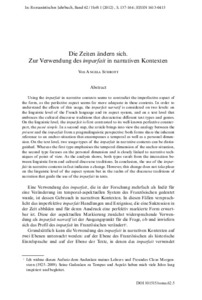Die Zeiten ändern sich. Zur Verwendung des imparfait in narrativen Kontexten
| dc.date.accessioned | 2021-05-28T12:43:38Z | |
| dc.date.available | 2021-05-28T12:43:38Z | |
| dc.date.issued | 2012 | |
| dc.identifier | doi:10.17170/kobra-202103083451 | |
| dc.identifier.uri | http://hdl.handle.net/123456789/12868 | |
| dc.language.iso | ger | ger |
| dc.rights | Urheberrechtlich geschützt | |
| dc.rights.uri | https://rightsstatements.org/page/InC/1.0/ | |
| dc.subject.ddc | 440 | |
| dc.title | Die Zeiten ändern sich. Zur Verwendung des imparfait in narrativen Kontexten | ger |
| dc.type | Aufsatz | |
| dcterms.abstract | Using the imparfait in narrative contexts seems to contradict the imperfective aspect of the form, as the perfective aspect seems far more adequate in these contexts. In order to understand the effects of this usage, the imparfait narrative is considered on two levels: on the linguistic level of the French language and its aspect system, and on a text level that embraces the cultural discourse traditions that characterise different text types and genres. On the linguistic level, the imparfait is first contrasted to its well-known perfective counter-part, the passé simple. In a second step, the article brings into view the analogy between the present and the imparfait from a pragmalinguistic perspective: both forms share the inherent reference to an anchor-situation that encompasses a temporal as well as a personal dimension. On the text level, two usage-types of the imparfait in narrative contexts can be distinguished. Whereas the first type emphasises the temporal dimension of the anchor-situation, the second type focuses on the personal dimension and is closely linked to narrative techniques of point of view. As the analysis shows, both types result from the interaction between linguistic form and cultural discourse traditions. In conclusion, the use of the imparfait in narrative contexts in fact indicates a change. However, this change does not take place on the linguistic level of the aspect system but in the realm of the discourse traditions of narration that guide the use of the imparfait in texts. | eng |
| dcterms.accessRights | open access | |
| dcterms.creator | Schrott, Angela | |
| dc.relation.doi | doi:10.1515/roma.62.5 | |
| dc.subject.swd | Imperfekt | ger |
| dc.subject.swd | Narrativität | ger |
| dc.subject.swd | Diskurstheorie | ger |
| dc.subject.swd | Tempus | ger |
| dc.type.version | publishedVersion | |
| dcterms.source.identifier | eissn:1613-0413 | |
| dcterms.source.identifier | issn:0080-3898 | |
| dcterms.source.issue | Heft 1 | |
| dcterms.source.journal | Romanistisches Jahrbuch | ger |
| dcterms.source.pageinfo | 137-164 | |
| dcterms.source.volume | Band 62 | |
| kup.iskup | false |
Files in this item
This item appears in the following Collection(s)
-
Publikationen [65]

